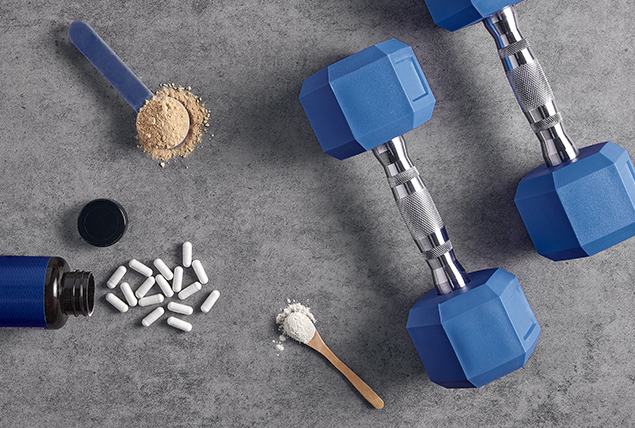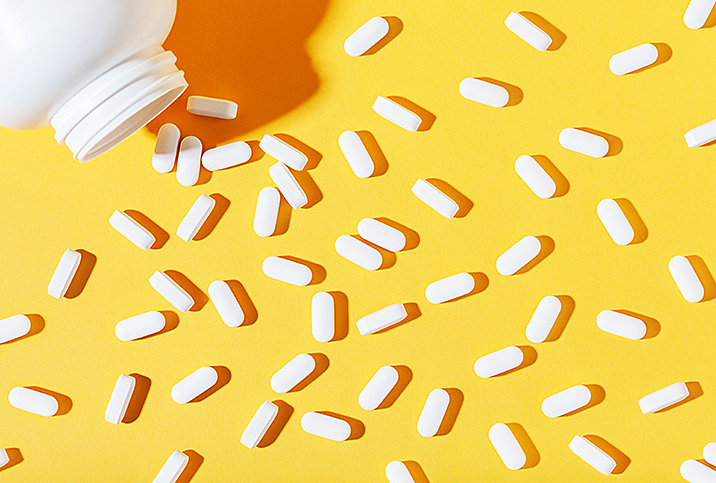Vitamins and Supplements: Before and After a Workout

When you walk through the glass doors of practically any gym in the country, you're bound to be met with rows of supplements, from giant tubs of protein powder to an array of pills and potions. These options range from standard vitamins to vaguely familiar-sounding options for creatine, glutamine, biotin, fish oil and BCAAs (that's branched-chain amino acids, for the uninitiated).
There's an unspoken (but sometimes loudly communicated) impression that if you want to get fit, you need to hit the gym and the supplements.
To be clear, this isn't necessarily true. It's perfectly possible to attain fitness-related goals without added supplements, especially if you're conscientious about daily nutrition. However, the right supplements taken before and/or after a workout could enhance or speed up results, depending on your goals.
Dietary supplements are not approved by the U.S. Food and Drug Administration (FDA) or any other national, standardized organization, so unless you're smart about your purchases and you stay focused on supplementing with only well-researched products, you may be wasting money on the equivalent of placebo pills.
Making better choices
How can you know the supplements you're choosing are high-quality and beneficial?
Unlike manufacturers of over-the-counter or prescription drugs, supplement companies aren't required to have products tested for quality prior to being sold. This means that just because a product reports to contain X, Y or Z ingredients, it may not (or it may at a small percentage). It also doesn't mean the ingredients in the supplement have been studied, tested and verified to provide the supposed benefits.
"[The] FDA is not authorized to approve dietary supplements for safety and effectiveness before they are marketed. In fact, in many cases, firms can lawfully introduce dietary supplements to the market without even notifying the FDA," the FDA states on its website.
Consumer awareness goes a long way. A good start is to do some research and select supplements that have been studied, tested and confirmed to be beneficial for the goals you have in mind. Just because your best friend's brother said he felt more energetic and stronger during his workouts when taking a certain supplement doesn't necessarily mean you'll get the same benefits or not experience side effects.
Another great starting point might be the research and recommendations on exercise and sports nutrition by the International Society of Sports Nutrition (ISSN).
You may also want to make sure the supplements you're purchasing have been tested by a third-party organization to verify their ingredients and safety. An article in the Journal of the Academy of Nutrition and Dietetics points to three third-party dietary supplement certification organizations and services: ConsumerLab.com, NSF International and the U.S. Pharmacopeia (USP).
Products that have passed the NSF or USP certifications are labeled as such, making it easier to identify them. You can also use the NSF's Certified for Sport app or the USP Verified Products Listing to identify certified products. ConsumerLab.com is a for-profit organization that tests and reviews products by collecting member fees. To receive the most recent findings, you can join its site as a member. While it doesn't offer certification to supplement companies (as the supplement companies aren't paying for testing), it may find positive or negative results regarding supplements that aren't otherwise being tested by a third party.
The primary objective when making a supplement choice is to verify the main ingredient(s) has been studied and confirmed to do what it's purported to do, then to choose a supplement brand that has been tested for quality and safety.
Why are you taking a supplement?
Given that supplements aren't a requirement for getting fit or healthy, it's important that you think about why you want to add a supplement to your routine before you spend a bunch of money.
"If your main goal is health-related, chances are you don't actually need that pre-workout to begin with. If your goals are performance-based, on the other hand, then there is more cause to seek out supplementation," said Andris Sturans, a CrossFit coach and athlete with precision nutrition coaching certification in Arizona. "Supplements are a way to make incremental steps toward your goals. We are talking single percentage points here, not leaps and bounds.
"When health is a major concern, there are lifestyle factors that push progress much further than supplementation, like changing your nutrition or remaining consistent with your exercise routine," Sturans added. "When performance is the main goal and everything else—your diet, exercise routine, sleep routine—is dialed in, supplementation might just be the last bit of edge needed to beat out an opponent, assuming the supplement in question is legal."
Is it difficult to find legal supplements worth considering?
"There aren't many that stack up," Sturans said.
Supplements and sexual health
One point to note about the supplement industry, particularly when focused on supplements geared to men, is that there's a big crossover between fitness and sexuality in the promotion of "manliness," "virility," "power" and "performance," both in and out of the gym.
It's important to remember, as Sturans noted, that a supplement is intended to help in small increments, not leaps and bounds. The vast majority of pre- or post-workout supplements are intended to help with fitness performance and not sexual performance.
While it's true exercise can help boost sex hormones, including testosterone, taking a supplement that contains testosterone may not be necessary (or a good idea). It's generally not a good idea to seek out "two-fers" that are marketed as both sexual and fitness performance supplements.
If you'd prefer to avoid testosterone replacement therapy (TRT) or if your testosterone is just beginning to drop, supplementation can help. Libido Boost vitamins can provide a steady stream of nutrients to keep your testosterone at acceptable levels. These Giddy Health supplements use only key ingredients that have been shown to help reduce stress, boost testosterone production and act as pro-erectile agents.
A regular, consistent exercise program might be all you need to help yourself in the bedroom, with no supplement required. If you feel you might need a little help in the realm of sexual health, talk to your doctor before seeking a supplement because medical reasons may be preventing you from experiencing the sexual-related performance you desire.
Pre- and post-workout supplements worth considering
"Plenty of supplement ingredients are on the market, but not all are well studied," said Merve Ceylan, M.S., a dietitian in Turkey who is focused on sports nutrition. "Caffeine, beta-alanine, sodium bicarbonate, beetroot juice [dietary nitrate] and isolated protein supplements are some of the well-researched. In contrast, there is limited evidence of the use of some performance enhancement supplements, including BCAAs, essential amino acids [EAAs], quercetin, arginine, fish oils, ketone and collagen supplements."
Here are popular options that have received the label "Strong evidence to support the efficacy and apparently safe" from the ISSN:
Hydroxymethylbutyrate (HMB)
For: Increasing muscle mass and reducing muscle damage during strength workouts.
Dose: 1.5 to 3 grams per day split into three servings, including pre-exercise.
Population: For muscle mass increases, it works best in untrained populations; for reducing muscle damage, it works in all populations.
Hydroxymethylbutyrate (HMB) is an amino acid that is well-studied and appears to be well-tolerated in amounts up to 6 grams per day (although 3 grams per day seems to be the ideal dosage for experiencing benefits).
For people new to exercise who want to see more significant increases in muscle mass and strength as they start their strength training program, HMB appears to be particularly helpful, according to the ISSN's position on the supplement. Even three to four weeks of supplementation makes a difference. There's evidence that when HMB is consumed as part of a regular workout routine, reductions in body fat percentage take place faster than with exercise alone.
Caffeine
For: Improved performance in endurance and anaerobic exercise, including long-distance events, sprinting, throwing, jumping and various sports.
Dose: 2 to 6 milligrams per kilogram (mg/kg) body mass (higher levels may be detrimental to performance); take 30 to 60 minutes before a bout of exercise, depending on the form (pills, gum, drinks, etc.)
Population: Trained and untrained individuals, although there's less benefit to people who consume caffeine regularly and have a tolerance built up.
"Caffeine is one of the well-researched supplements. It may have small to moderate benefits on muscular strength and endurance, and it has been shown to be effective in aerobic endurance activities," Ceylan said.
Why is it so effective as an ergogenic aid? If you reach for a cup of coffee in the morning to help kick-start your day, you likely already understand why.
"Caffeine is a potent stimulant that can increase the body's heart rate and blood pressure to prepare it for bouts of activity," Sturans said. "It has been shown to decrease RPE [rate of perceived exertion] for a time. This means it can make you feel less tired in the short term if taken as part of a pre-workout routine."
Sodium bicarbonate
For: Exercise performed at high-intensity levels lasting between 30 seconds and 12 minutes (high-intensity running, boxing, combat sports, swimming, cycling, rowing, etc.)
Dose: 0.2 to 0.5 grams per kilogram (g/kg) body mass; take between 60 to 180 minutes before exercise.
Population: Appears to be beneficial for all populations.
You may be familiar with sodium bicarbonate in its "over-the-counter" name of baking soda. This common household product can be particularly helpful for people competing in high-intensity sports and activities, but likely isn't worth taking if you're just trying to get healthy, or you tend to participate in standard cardio or strength training activities.
The ISSN also notes in its sodium bicarbonate position that the benefits of this supplement may increase with chronic use or when combined with other supplements, such as creatine and beta-alanine.
"Household baking soda is an economical source of sodium bicarbonate. However, athletes generally prefer to take it as a tablet or capsule," Ceylan noted. "It has been shown to improve power, speed, time to failure and work capacity."
Creatine monohydrate
For: Increasing high-intensity exercise capacity and lean body mass.
Dose: Starting with 0.3 g/kg body mass per day for five to seven days to build up stores, followed by 3 to 5 grams per day thereafter.
Population: All populations.
The ISSN doesn't tiptoe around the bush, stating in a sports nutrition review, "The most effective nutritional supplement available to athletes to increase high-intensity exercise capacity and muscle mass during training is creatine monohydrate. Numerous studies have indicated that creatine supplementation increases body mass and/or muscle mass during training."
In fact, as the most-studied supplement, it also appears to be safe and effective in practically all ages, health statuses and populations.
"Creatine is one that has been shown to be of benefit for strength and power-based bouts of exercise. However, it has also been shown to help with chronic muscle retention, which could be of benefit to just about anyone," Sturans said. "Supplementing with creatine before and during exercise can be beneficial for energy production."
Protein
For: Anyone looking to build or maintain muscle mass.
Dose: Total daily protein intake ranging from 1.4 to 2 g/kg body weight per day; for supplementation, recommendations are .25 g/kg body weight or a total dose of 20 to 40 grams; protein should be ingested both before and after your workout, with no more than four hours between each protein intake. If taken one hour before your workout and the workout lasts an hour, the next intake should be within two hours.
Population: Supplementation is typically based on convenience rather than need; populations who require supplementation include people who aren't getting enough protein in their diets, those who are recovering from an injury or who are increasing their workout intensity.
Protein gets a lot of hype, and it's not without reason. Protein—whether taken in supplement or food form—provides the amino acids necessary to rebuild and repair muscle cells. Exercise actually damages the muscles, and protein is required to help build those damaged cells back (bigger and stronger) following a bout of exercise.
It's possible to consume all the protein you need in a normal diet, but sometimes eating a piece of chicken or a couple of boiled eggs before or after a workout isn't convenient or easy to do. That's where protein bars, powders, drinks and other supplements can come in handy.
"Casein and whey supplements are largely used as protein supplements," Ceylan explained. "They may benefit muscle building for people who aren't getting enough protein in their diets, such as vegetarians or vegan athletes, or those who are recovering from injuries or increasing their workout intensities."
The ISSN emphasizes athletes should try to get most of their protein through whole-food sources rather than supplements, although the slow-release casein is a good option to use overnight to keep muscle protein synthesis (muscle-building action) high.
Do research, make wise choices
"Quick fixes" are popular, and the supplement industry is oversaturated with tested and untested products with wide-ranging and wild marketing claims.
The best advice is to take any marketing claims with a grain of salt. Then read the ingredients and cross-reference them with quality information from third-party testing and nutrition organizations.
"One thing I typically try to stay away from isn't a substance itself but the use of 'proprietary blends' and the like," Sturans said. "I have a problem with blends of substances that may or may not be entirely disclosed on a label. I tend to recommend products with the fewest active ingredients. Taking one substance at a time helps to weed out what is actually working and what isn't."
Editor's note: These statements have not been evaluated by the Food and Drug Administration. Our medical experts advise that you consult with your primary healthcare provider before you begin using a supplement. This information is not intended to diagnose, treat, cure or prevent disease.


















